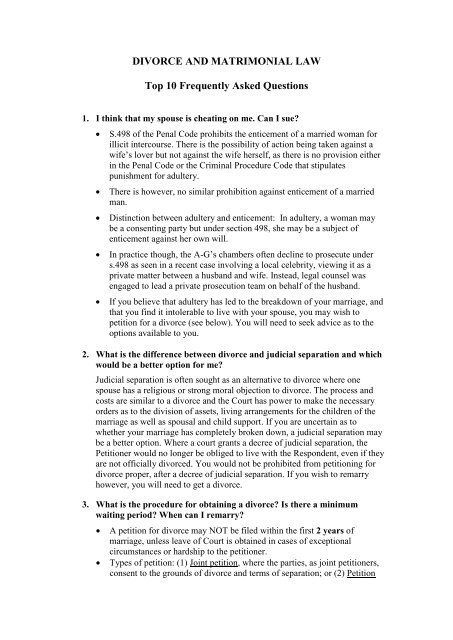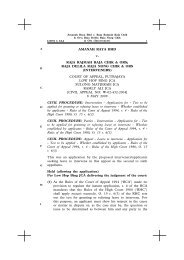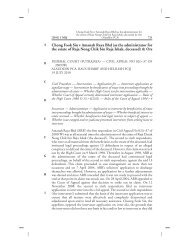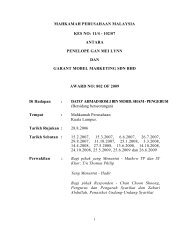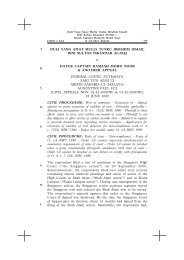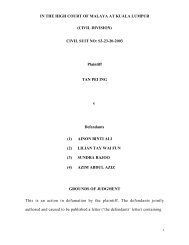DIVORCE AND MATRIMONIAL LAW
DIVORCE AND MATRIMONIAL LAW
DIVORCE AND MATRIMONIAL LAW
Create successful ePaper yourself
Turn your PDF publications into a flip-book with our unique Google optimized e-Paper software.
<strong>DIVORCE</strong> <strong>AND</strong> <strong>MATRIMONIAL</strong> <strong>LAW</strong><br />
Top 10 Frequently Asked Questions<br />
1. I think that my spouse is cheating on me. Can I sue?<br />
S.498 of the Penal Code prohibits the enticement of a married woman for<br />
illicit intercourse. There is the possibility of action being taken against a<br />
wife’s lover but not against the wife herself, as there is no provision either<br />
in the Penal Code or the Criminal Procedure Code that stipulates<br />
punishment for adultery.<br />
There is however, no similar prohibition against enticement of a married<br />
man.<br />
Distinction between adultery and enticement: In adultery, a woman may<br />
be a consenting party but under section 498, she may be a subject of<br />
enticement against her own will.<br />
In practice though, the A-G’s chambers often decline to prosecute under<br />
s.498 as seen in a recent case involving a local celebrity, viewing it as a<br />
private matter between a husband and wife. Instead, legal counsel was<br />
engaged to lead a private prosecution team on behalf of the husband.<br />
If you believe that adultery has led to the breakdown of your marriage, and<br />
that you find it intolerable to live with your spouse, you may wish to<br />
petition for a divorce (see below). You will need to seek advice as to the<br />
options available to you.<br />
2. What is the difference between divorce and judicial separation and which<br />
would be a better option for me?<br />
Judicial separation is often sought as an alternative to divorce where one<br />
spouse has a religious or strong moral objection to divorce. The process and<br />
costs are similar to a divorce and the Court has power to make the necessary<br />
orders as to the division of assets, living arrangements for the children of the<br />
marriage as well as spousal and child support. If you are uncertain as to<br />
whether your marriage has completely broken down, a judicial separation may<br />
be a better option. Where a court grants a decree of judicial separation, the<br />
Petitioner would no longer be obliged to live with the Respondent, even if they<br />
are not officially divorced. You would not be prohibited from petitioning for<br />
divorce proper, after a decree of judicial separation. If you wish to remarry<br />
however, you will need to get a divorce.<br />
3. What is the procedure for obtaining a divorce? Is there a minimum<br />
waiting period? When can I remarry?<br />
A petition for divorce may NOT be filed within the first 2 years of<br />
marriage, unless leave of Court is obtained in cases of exceptional<br />
circumstances or hardship to the petitioner.<br />
Types of petition: (1) Joint petition, where the parties, as joint petitioners,<br />
consent to the grounds of divorce and terms of separation; or (2) Petition
for Divorce, where the divorce is contested, with one spouse as the<br />
petitioner and the other, the respondent.<br />
A divorce petition may only be presented after the matrimonial difficulty<br />
has been referred to a conciliatory body such as a marriage tribunal, and<br />
the conciliatory body has certified, after 6 months, that it has failed to<br />
reconcile the parties. This requirement does not apply to cases of divorce<br />
on the grounds of conversion to Islam or to joint petitions for divorce and<br />
further exceptions are made where the respondent is in prison, suffers from<br />
an incurable mental disease, or whose whereabouts are unknown.<br />
At the hearing of your divorce petition, a Decree Nisi will be granted by a<br />
judge if (s)he is satisfied that you have the legal right to a divorce. The<br />
Decree Nisi will be made absolute after a period of 3 months, after which<br />
the parties may remarry if they so wish.<br />
You need to seek advice as to your options at this stage. You may wish to<br />
consider alternative dispute resolution such as Divorce Mediation, which is<br />
a quicker and more economical way forward, and may be more appropriate<br />
for you and your spouse. (Please see the article “Divorce Mediation” by<br />
our Family Dispute Resolution unit)<br />
4. What are the grounds for Divorce?<br />
There is really only one ground for divorce – the irretrievable breakdown of a<br />
marriage. This is proved by establishing one or more of the following facts:<br />
Intolerable Behaviour<br />
You must show that your spouse has behaved in such a way that you<br />
cannot reasonably be expected to live with him or her.<br />
Adultery<br />
You must prove beyond reasonable doubt, either through actual<br />
admission or by way of sufficient circumstantial evidence that sexual<br />
intercourse has taken place between your spouse and another person of<br />
the opposite sex and that you find it intolerable to live with your<br />
spouse. Proving this may be complex and you should seek advice.<br />
Adultery can be used as the basis for a divorce petition whether you<br />
and your spouse are still living together or have separated.<br />
Two Year Separation<br />
You and your spouse have been living apart, for a continuous period of<br />
at least two years before the filing of the petition. There may be<br />
circumstances where a Court may be of the view that spouses have<br />
been living separately even when they are living under the same roof.<br />
You should seek advice as to whether this applies to you.<br />
Desertion<br />
Where your spouse has deserted you for a continuous period of at least<br />
two years before the filing of the petition.<br />
You will NOT need to prove the above facts, if your divorce is mediated and a<br />
separation agreement is reached. Your divorce may then be reached via a Joint<br />
Petition. Please see our article on “<strong>DIVORCE</strong> MEDIATION” by our Family<br />
Dispute Resolution unit, for more information.
5. What is the difference between legal custody and physical custody (or<br />
care & control)? My spouse and I both want custody of our children.<br />
What will happen if we cannot agree?<br />
Legal custody: authority to make decisions over the health, safety and<br />
welfare of the child. Where parents have joint custody of a child, they both<br />
have an equal say as to decisions affecting their child.<br />
Physical custody (sometimes referred to as “care and control”): Deals with<br />
matters like where the child resides and how much time each parent spends<br />
with the child.<br />
Access/ visitation rights: The right of a parent to visit a child who is in the<br />
care and control of the other parent.<br />
If you and your spouse cannot agree on issues relating to the children, a Court<br />
will decide in the best interests of your children, which parent is to have<br />
custody and the extent of access for non-custodial parents. You may wish to<br />
consider Mediation which would give you greater control over the outcome<br />
and put into place a shared parenting plan that’s workable for all parties<br />
concerned.<br />
6. Can I apply for my spouse to pay spousal maintenance to me?<br />
A court may order a man to pay maintenance to his wife or former wife. In<br />
deciding the sum for spousal maintenance, the Court will have regard to:<br />
future and present income, property resources and earning capacity of<br />
both parties;<br />
financial needs of both parties;<br />
degree of responsibility which the Court apportions to each party for<br />
the breakdown of marriage.<br />
A woman may be ordered to pay maintenance to her husband or former<br />
husband where he is incapacitated from earning a livelihood by reason of<br />
mental or physical injury or ill health and the Court is satisfied that it is<br />
reasonable to do so, having considered her means.<br />
7. Can I apply for my spouse to pay maintenance for the children? Can the<br />
children expect payments that would support a standard of living that<br />
they had enjoyed during the existence of the marriage?<br />
It is the duty of a parent to maintain or contribute to the maintenance of his or<br />
her children, as may be reasonable, having regard to his/her means. In<br />
determining the amounts to be paid the Court will take into account the<br />
standard of living that the children were accustomed to in the past.<br />
8. How are assets acquired during the marriage divided? What if one party<br />
contributed more money than the other in acquiring the assets?<br />
The court will strive to make a fair and equitable division of the assets or the<br />
proceeds of sale of such assets, taking into account:<br />
The extent of the contributions made by each party in money, property or<br />
work towards the acquiring of the assets;
Any debts owing by either party which were contracted for their joint<br />
benefit; and<br />
The needs of the minor children, if any, of the marriage<br />
Subject to the considerations above, the Court would be inclined towards the<br />
equality of division.<br />
However where the assets are acquired by the sole effort of one party to the<br />
marriage, the Court will have regard to the extent of the contributions made by<br />
the other party who did not acquire the assets to the welfare of the family by<br />
looking after the home or caring for the family, as well as the needs of the<br />
children, but in any event, the party by whose efforts the assets were acquired<br />
shall receive a greater proportion.<br />
9. Do the Malaysian Courts have jurisdiction to grant a divorce where one<br />
spouse is a foreigner?<br />
The Malaysian Courts has jurisdiction to grant a decree of divorce where the<br />
domicile of both parties to the marriage is in Malaysia, at the time when the<br />
petition is presented.<br />
10. I have heard that a litigated divorce can take years, is very expensive and<br />
all our “dirty laundry” may be aired in Court. My kids are traumatised<br />
from all the fighting. I just want a solution that’s fair to both sides and<br />
not have to leave it to a judge, who may not decide in my interests. What<br />
are the alternatives to fighting in out in Court?<br />
Divorce Mediation is an alternative to Litigation that has been used<br />
extensively and successfully in Australia, Canada, the US and parts of Europe.<br />
It is a quicker, cheaper non-adversarial way of reaching a fair and workable<br />
solution to all issues that arise from their separation, including their children,<br />
property and maintenance. For more information, please see “<strong>DIVORCE</strong><br />
MEDIATION” by our Family Dispute Resolution Unit.


